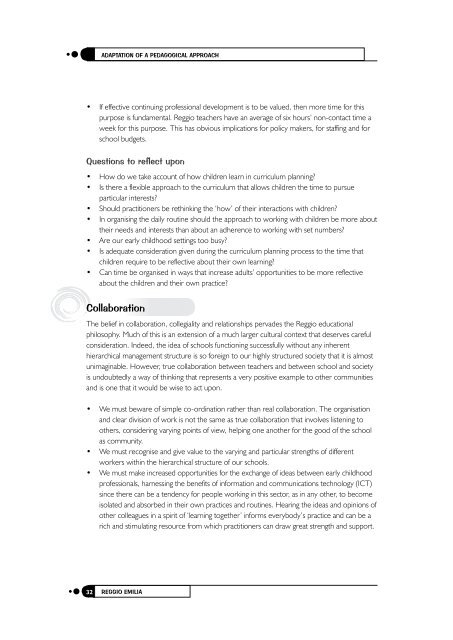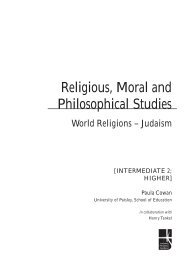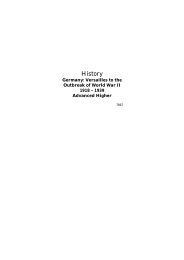The Reggio Emilia Approach to Early Years - Education Scotland
The Reggio Emilia Approach to Early Years - Education Scotland
The Reggio Emilia Approach to Early Years - Education Scotland
You also want an ePaper? Increase the reach of your titles
YUMPU automatically turns print PDFs into web optimized ePapers that Google loves.
ADAPTATION OF A PEDAGOGICAL APPROACH<br />
• If effective continuing professional development is <strong>to</strong> be valued, then more time for this<br />
purpose is fundamental. <strong>Reggio</strong> teachers have an average of six hours’ non-contact time a<br />
week for this purpose. This has obvious implications for policy makers, for staffing and for<br />
school budgets.<br />
Questions <strong>to</strong> reflect upon<br />
• How do we take account of how children learn in curriculum planning?<br />
• Is there a flexible approach <strong>to</strong> the curriculum that allows children the time <strong>to</strong> pursue<br />
particular interests?<br />
• Should practitioners be rethinking the ‘how’ of their interactions with children?<br />
• In organising the daily routine should the approach <strong>to</strong> working with children be more about<br />
their needs and interests than about an adherence <strong>to</strong> working with set numbers?<br />
• Are our early childhood settings <strong>to</strong>o busy?<br />
• Is adequate consideration given during the curriculum planning process <strong>to</strong> the time that<br />
children require <strong>to</strong> be reflective about their own learning?<br />
• Can time be organised in ways that increase adults’ opportunities <strong>to</strong> be more reflective<br />
about the children and their own practice?<br />
Collaboration<br />
<strong>The</strong> belief in collaboration, collegiality and relationships pervades the <strong>Reggio</strong> educational<br />
philosophy. Much of this is an extension of a much larger cultural context that deserves careful<br />
consideration. Indeed, the idea of schools functioning successfully without any inherent<br />
hierarchical management structure is so foreign <strong>to</strong> our highly structured society that it is almost<br />
unimaginable. However, true collaboration between teachers and between school and society<br />
is undoubtedly a way of thinking that represents a very positive example <strong>to</strong> other communities<br />
and is one that it would be wise <strong>to</strong> act upon.<br />
• We must beware of simple co-ordination rather than real collaboration. <strong>The</strong> organisation<br />
and clear division of work is not the same as true collaboration that involves listening <strong>to</strong><br />
others, considering varying points of view, helping one another for the good of the school<br />
as community.<br />
• We must recognise and give value <strong>to</strong> the varying and particular strengths of different<br />
workers within the hierarchical structure of our schools.<br />
• We must make increased opportunities for the exchange of ideas between early childhood<br />
professionals, harnessing the benefits of information and communications technology (ICT)<br />
since there can be a tendency for people working in this sec<strong>to</strong>r, as in any other, <strong>to</strong> become<br />
isolated and absorbed in their own practices and routines. Hearing the ideas and opinions of<br />
other colleagues in a spirit of ‘learning <strong>to</strong>gether’ informs everybody’s practice and can be a<br />
rich and stimulating resource from which practitioners can draw great strength and support.<br />
REGGIO EMILIA

















